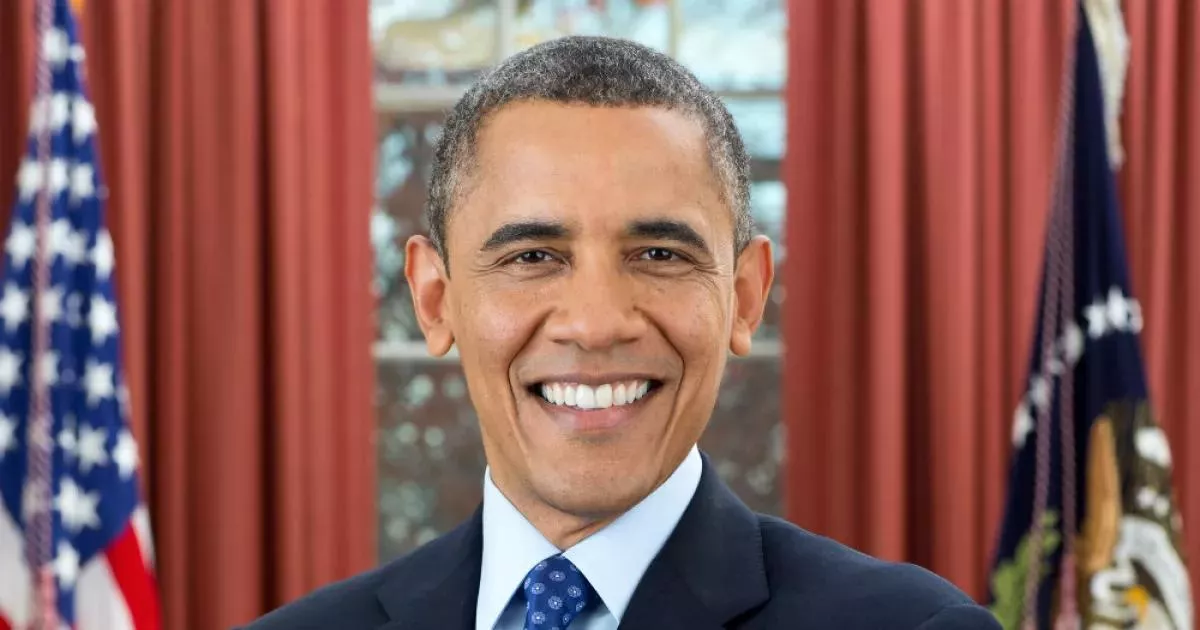A closer look at the biggest achievements of Barack Obama. Awards, milestones, and records that define success.
Barack Obama, the 44th U.S. President (2009-2017), was the first African American to hold the office. A Democrat, he served as a U.S. Senator for Illinois (2005-2008) and an Illinois State Senator (1997-2004). His presidency was marked by the Affordable Care Act, the end of the Iraq War, and the killing of Osama bin Laden. Prior to his political career, Obama was a community organizer and civil rights attorney. He is a graduate of Columbia University and Harvard Law School.
1993: 40 under Forty
In 1993, Crain's Chicago Business named Obama to its list of "40 under Forty" powers to be.
1996: Election to Illinois Senate
In 1996, Barack Obama was elected to the Illinois Senate, succeeding Alice Palmer.
1998: Re-election to Illinois Senate
In 1998, Barack Obama was re-elected to the Illinois Senate, defeating Republican Yesse Yehudah.
2002: Re-election to Illinois Senate
In 2002, Barack Obama was re-elected again to the Illinois Senate.
March 2004: Landslide Victory in Primary Election
In the March 2004 primary election, Barack Obama won in an unexpected landslide, which elevated him within the Democratic Party and led to the reissue of his memoir, Dreams from My Father.
July 2004: Keynote Address at Democratic National Convention
In July 2004, Barack Obama delivered the keynote address at the 2004 Democratic National Convention, which was well received and elevated his status within the Democratic Party.
November 2004: Election to U.S. Senate
In November 2004, Barack Obama won the general election for U.S. Senate with 70 percent of the vote, the largest margin of victory for a Senate candidate in Illinois history.
January 3, 2005: Sworn in as a Senator
On January 3, 2005, Barack Obama was sworn in as a senator, becoming the only Senate member of the Congressional Black Caucus.
2006: Grammy Award for Dreams from My Father
In 2006, Obama received a Grammy Award for Best Spoken Word Album for Dreams from My Father.
June 2, 2008: Obama Clinches Democratic Nomination
On June 2, 2008, Barack Obama received enough votes to clinch the Democratic presidential nomination, marking a significant milestone in his political career.
2008: Nomination by the Democratic Party for president.
In 2008, Barack Obama was nominated by the Democratic Party for president after a close primary campaign against Hillary Clinton. He selected Joe Biden as his running mate and would later defeat Republican nominee John McCain and his running mate Sarah Palin.
2008: Obama's effective campaign
In 2008, Obama ran one of the most effective campaigns in American history and proved himself to be one of the most talented political orators of the 21st century.
2008: TIME Magazine's Time Person of the Year
In 2008, Obama was named TIME Magazine's Time Person of the Year.
2008: Passage of Amendment to Defense Authorization Act
In the spring of 2008, Barack Obama's amendment to the Defense Authorization Act, adding safeguards for personality-disorder military discharges, passed the full Senate.
2008: Great Recession
Many commentators credit Obama with averting a threatened depression and pulling the economy back from the Great Recession in 2008.
February 2009: Obama Rated Most Respected World Leader
In February 2009, a poll conducted in Western Europe and the U.S. by Harris Interactive rated Obama as the most respected and powerful world leader.
February 17, 2009: Obama Signs American Recovery and Reinvestment Act
On February 17, 2009, President Obama signed the American Recovery and Reinvestment Act of 2009, a $787 billion economic stimulus package, equivalent to $1153 billion in 2024. This act aimed to help the economy recover from the global recession and included increased federal spending for health care, infrastructure, education, tax breaks, incentives, and direct assistance to individuals.
March 2009: Intervention in Automotive Industry
In March 2009, President Obama intervened in the troubled automotive industry by renewing loans for General Motors (GM) and Chrysler to allow them to continue operations while reorganizing. The White House set terms for both firms' bankruptcies, including the sale of Chrysler to Fiat and a reorganization of GM giving the U.S. government a temporary 60 percent equity stake.
May 2009: Obama Rated Most Popular World Leader
In May 2009, another poll by Harris rated Obama as the most popular world leader, with many people pinning their hopes on him to lead the world out of the economic downturn.
June 2009: Call to accelerate economic stimulus
In June 2009, President Obama, dissatisfied with the pace of economic stimulus, called on his cabinet to accelerate the investment. He also signed into law the Car Allowance Rebate System, known as "Cash for Clunkers", which temporarily boosted the economy.
August 6, 2009: Confirmation of Sonia Sotomayor
On August 6, 2009, Sonia Sotomayor was confirmed as a Supreme Court Justice, becoming the first Justice of Hispanic descent.
October 9, 2009: Obama wins Nobel Peace Prize
On October 9, 2009, the Norwegian Nobel Committee announced that Obama had won the 2009 Nobel Peace Prize "for his extraordinary efforts to strengthen international diplomacy and cooperation between peoples".
2009: Nobel Peace Prize received
In 2009, Obama received the Norwegian Nobel Committee's Nobel Peace Prize.
March 21, 2010: House Passage of the Affordable Care Act
On March 21, 2010, the Patient Protection and Affordable Care Act (ACA, colloquially "Obamacare") passed by the Senate in December was passed in the House by a vote of 219 to 212.
March 23, 2010: Signing the Affordable Care Act into Law
On March 23, 2010, President Obama signed the Patient Protection and Affordable Care Act (ACA), colloquially known as "Obamacare", into law.
August 5, 2010: Confirmation of Elena Kagan
On August 5, 2010, Elena Kagan was confirmed, bringing the number of women sitting simultaneously on the Court to three for the first time in American history.
December 17, 2010: Tax Relief, Unemployment Insurance Reauthorization, and Job Creation Act
On December 17, 2010, President Obama signed the Tax Relief, Unemployment Insurance Reauthorization, and Job Creation Act of 2010. This $858 billion act passed with bipartisan majorities in both houses of Congress and included a temporary two-year extension of the 2001 and 2003 income tax rates, a one-year payroll tax reduction, continuation of unemployment benefits, and a new rate and exemption amount for estate taxes.
May 1, 2011: Osama bin Laden Killed in U.S. Raid
On May 1, 2011, a "surgical raid" authorized by President Obama and conducted by United States Navy SEALs resulted in the shooting death of Osama bin Laden in Abbottabad, Pakistan.
August 2, 2011: Signing of the Budget Control Act of 2011
On August 2, 2011, President Obama signed the bipartisan Budget Control Act of 2011 after a congressional debate over raising the nation's debt limit. The legislation enforced limits on discretionary spending until 2021, established a procedure to increase the debt limit, created a Congressional Joint Select Committee on Deficit Reduction, and established automatic procedures for reducing spending if the committee's legislation did not achieve sufficient savings, preventing a U.S. government default.
April 3, 2012: Obama Secures Democratic Nomination
On April 3, 2012, Barack Obama secured the 2778 convention delegates needed to win the Democratic nomination, paving the way for his reelection campaign.
June 28, 2012: Supreme Court Ruling on ACA Mandate
On June 28, 2012, the Supreme Court ruled by a 5–4 vote in National Federation of Independent Business v. Sebelius that the individual mandate in the Affordable Care Act (ACA) was constitutional under the U.S. Congress's taxing authority.
November 6, 2012: Obama Wins Reelection
On November 6, 2012, Barack Obama won 332 electoral votes, securing his reelection as president and becoming the first Democratic president since Franklin D. Roosevelt to win the majority of the popular vote twice.
2012: Re-election as President
In 2012, Obama defeated Republican opponent Mitt Romney in the presidential election, securing his second term as President.
2012: TIME Magazine's Time Person of the Year
In 2012, Obama was named TIME Magazine's Time Person of the Year.
2014: Ambassador of Humanity Award received
In 2014, Obama received The Shoah Foundation Institute for Visual History and Education's Ambassador of Humanity Award.
June 2015: Supreme Court Ruling in King v. Burwell
In June 2015, the Supreme Court ruled 6–3 in King v. Burwell that subsidies to help individuals and families purchase health insurance were authorized for those doing so on both the federal exchange and state exchanges, not only those purchasing plans "established by the State", as the statute reads.
2015: Brookings Institution rank
In 2015, the Brookings Institution ranked Obama the 18th-greatest American president.
January 2017: Obama leaves office with 60 percent approval rating
In January 2017, Obama left office with a 60 percent approval rating.
2017: John F. Kennedy Profile in Courage Award received
In 2017, Obama received the John F. Kennedy Profile in Courage Award.
2018: Robert F. Kennedy Center for Justice and Human Rights Ripple of Hope Award received
In 2018, Obama received the Robert F. Kennedy Center for Justice and Human Rights Ripple of Hope Award.
2018: Gallup job approval poll
In Gallup's 2018 job approval poll for the past 10 U.S. presidents, Obama received a 63 percent approval rating.
March 4, 2022: Obama Wins Audio Publishers Association Award
On March 4, 2022, Obama received an Audio Publishers Association (APA) Award for Best Narration by the Author for his narration of his memoir, "A Promised Land."
2022: Primetime Emmy Award for Our Great National Parks
In 2022, Obama received a Primetime Emmy Award for Outstanding Narrator for Our Great National Parks.
2023: Primetime Emmy Award for Working: What We Do All Day
In 2023, Obama received a Primetime Emmy Award for Outstanding Narrator for Working: What We Do All Day.
2024: Sylvanus Thayer Award
In 2024, Obama became the first and so far only President from the Democratic Party to win the Sylvanus Thayer Award.
2025: Primetime Emmy Award for Our Oceans
In 2025, Obama received a Primetime Emmy Award for Outstanding Narrator for Our Oceans.
Mentioned in this timeline

Donald John Trump is an American politician media personality and...

Pope Francis served as the head of the Catholic Church...

Michelle Obama an American attorney and author served as the...

Bill Clinton the nd U S President - served as...

Hillary Diane Rodham Clinton is a prominent American politician lawyer...

John F Kennedy JFK was the th U S President...
Trending

52 minutes ago Selena Gomez's Spiced-Plum Manicure and TikTok Clone Theory Spark Buzz

53 minutes ago Kit Harington and Sophie Turner Gag After On-Screen Kiss in New Movie

53 minutes ago Trump administration updates, Iran nuclear efforts, and White House controversies unfold.

53 minutes ago Dario Amodei Highlights India's Central Role in Shaping AI's Future at AI Summit.

2 hours ago Yoon Suk Yeol, South Korean ex-president, receives life sentence for insurrection and martial law.

4 hours ago Maya Hawke and Christian Lee Hutson celebrated wedding with Stranger Things cast present.
Popular

Jesse Jackson is an American civil rights activist politician and...
Randall Adam Fine is an American politician a Republican who...

Pam Bondi is an American attorney lobbyist and politician currently...

Barack Obama the th U S President - was the...

Martin Luther King Jr was a pivotal leader in the...

Ken Paxton is an American politician and lawyer serving as...


